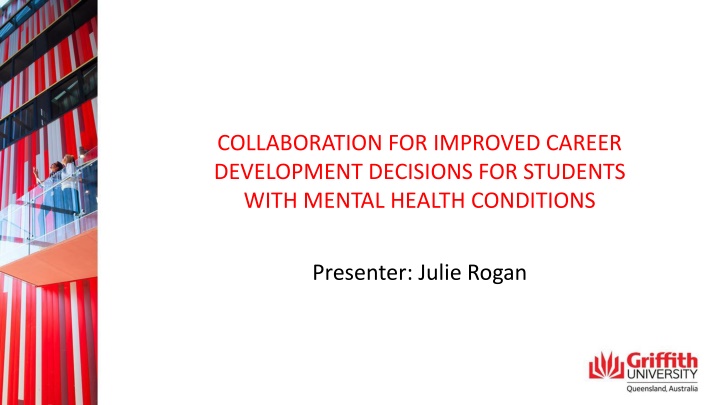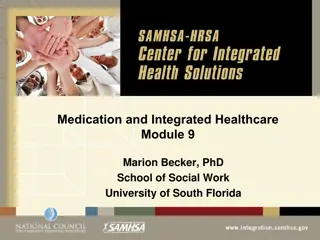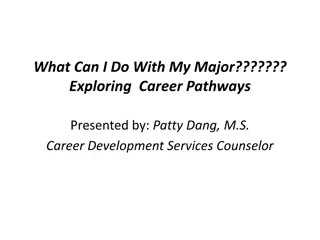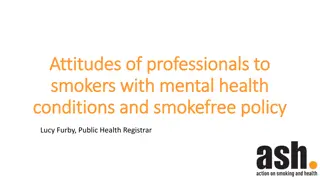Enhancing Career Development Decisions for Students with Mental Health Conditions
Explore the significance of career conversations for students with mental health conditions through case studies. Delve into the importance of providing guidance, understanding industry implications, building resilience, and fostering strong relationships for effective career development support.
Download Presentation

Please find below an Image/Link to download the presentation.
The content on the website is provided AS IS for your information and personal use only. It may not be sold, licensed, or shared on other websites without obtaining consent from the author.If you encounter any issues during the download, it is possible that the publisher has removed the file from their server.
You are allowed to download the files provided on this website for personal or commercial use, subject to the condition that they are used lawfully. All files are the property of their respective owners.
The content on the website is provided AS IS for your information and personal use only. It may not be sold, licensed, or shared on other websites without obtaining consent from the author.
E N D
Presentation Transcript
COLLABORATION FOR IMPROVED CAREER DEVELOPMENT DECISIONS FOR STUDENTS WITH MENTAL HEALTH CONDITIONS Presenter: Julie Rogan
Student one: First year of nursing, Trimester 2, just completed a placement Referred by: School of Nursing and Midwifery placement co-ordinator Presented with: Depression, generalised anxiety disorder Triggers: Stress, lack of sleep, seasonal (worse on dark dreary days) Impact: Being on own for a lengthy period of time, making poor decisions, difficulty speaking to people, needs 8-10 hours sleep per night, medication meant she could not sleep during the day Placement Co-ordinator was concerned- although this placement went well, 'warning bells were ringing as the student had written on her form she could never do night shift
Student two: Completed an undergraduate course in IT, yet to enrol in his Masters to be a Secondary School teacher all his family were teachers Referred by: Self Presented with: Social anxiety, performance phobia, PTSD and Asperger's Triggers: Speaking to groups of people, no structure, panic attacks when he feels threatened or singled out Impact: Cannot complete tasks if they are not well structured, panics when someone asks him a question, sweats and sometimes has panic attacks if required to present
Now: hold those thoughts we will keep coming back to the case studies But neither of those students had any career advice or even much of a career conversation with anybody Would it have made ay difference?
HOW IMPORTANT IS THE CAREER CONVERSATION? - - - They may not have had career guidance in school Do they know anything about the industry they are going into? How aware are they of their condition and its impact on the type of work? How resourceful/resilient are they to put in new strategies? What is the purpose of study (may be solely for interest/means to another end Do they actually want a career as a .. - - - As a DSO, - how much do we know about the world of work? - Do we collaborate with Careers team? - How strong is our relationship with the student ? - Have we got strong relationships internally and externally?
About Griffith University 47,260 students, 4,489 FTE staff, 5 campus in 2017 In 2016 about 5% enrolments were SWD, 50% of those registered for support Disability Services: Offer appointments throughout the calendar year up to 45 minutes face to face, phone, email, skype Present at Orientations invited by academic schools Collaborate with Academics/ Academic School Collaborate with other student services teams student welfare, careers, counselling, psychologists Relationships with outside agencies Headspace, external psychologists, hospital mental health team, interagency meetings, TAFE Disability Awareness Training to other staff Student Case meetings with professional and academic staff
TWO OTHER PROGRAMS AT GRIFFITH Unitemps - is an employment agency based at the University, providing work opportunities for students and graduates. It covers paid placements on campus and in south-east Queensland businesses. Unitemps Griffith offers the flexibility of work assignments from casual to full-time roles and everything in between. USEP - University Specialist Employment Partnerships is a trial, local on- campus employment services that has been developed with and for graduates with disability in Australia, to improve rates of employment for students after University. It is a collaboration between Griffith University, Mylestones Disability Employment Services and the National Disability Coordination Officer Program.
SO WE: Don t say it is not possible to study, but how are they going to make it possible? Do they want to make it possible? Suggest activities: research into the sector Consider the impact of their condition on their choice of career Strategies to overcome the difficulties Refer to careers Build relationships with careers And are presently developing simple questions to add to our registration
- QUESTIONS TO CONSIDER - - - - - What are your challenges? How do we make time? How do know what to ask ? We don t know Careers? How do we make it easier for the student? How do we make it easier for the DSO























